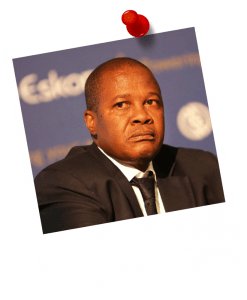Anoj SIngh
Singh joined Eskom as chief financial officer in August 2015. In September 2017, he was officially suspended as Eskom’s CFO, pending a disciplinary hearing. On 22 January 2018, Eskom issued a statement confirming that Singh had resigned while still under suspension.
Singh is alleged to have accepted trips abroad from the Gupta family after signing off on the deal with Tegeta and is facing questions about the payment of hundreds of millions of rand from the power company to Trillian without any clear benefit.
On 23 January 2018, the South African Federation of Trade Unions called for Singh to be criminally charged for corruption and impropriety. “Anoj and others have brought the country’s power provider to the brink of bankruptcy, which would have devastating consequences for all South Africans and the country’s economy.”
Civil society organisation OUTA has laid charges of corruption and financial misconduct against Singh.
Mark Pamensky
Pamensky was a director of Eskom Holdings at the same time that he was a director of at least one company in the Gupta business empire. He was appointed to the Eskom board three months after joining the board of Gupta-owned Oakbay Resources and Energy, as well as Shiva Uranium. Of all the Eskom directors, Pamensky was the one with the most solid direct links to the Guptas.
Pamensky passed on information gained at Eskom to the Guptas which helped them in their R2.15-billion purchase of Optimum Coal Holdings, which has coal contracts with Eskom and which received substantial help from Eskom.
OUTA has also laid charges of corruption and breaches of the Companies Act and the Public Finance Management Act against Pamensky.
The Rand Daily Mail said this of him: “Pamensky, who recently resigned from both Eskom and Oakbay, was intimately involved in brokering the controversial Optimum deal and advised the Guptas to ensure that they did not pay the R2.1-billion fine which had been imposed by Eskom on Glencore.”
Brian Molefe
Former public protector Thuli Madonsela, in her State of Capture report, refers extensively to Brian Molefe. The report found that the Guptas, with Eskom’s assistance, caused the Optimum coal mine to go out of business.
Then CEO of Eskom, Molefe was found to be in touch with the Guptas on a regular basis. In fact, Molefe’s relationship with the Guptas featured as one of the report’s main findings while Ajay Gupta admitted to the public protector that Molefe was a good friend, often visiting him at his Saxonwold home.
On 11 November 2016 Brian Molefe resigned after just 18 months as Eskom CEO, a move that was confirmed by Eskom. However, he received a R30-million payout from the utility, supposedly as a pension, and then neither he nor Eskom could decide whether he had been retrenched, had resigned or had resigned. In January 2018 a court set aside the R30m payout and directed Molefe to pay back all the money paid to him thus far.
Molefe returned to Eskom as CEO in May 2017 but two weeks later departed again after then energy minister Lynne Brown ordered the board to reverse his reinstatement.
Venete Klein
Klein was appointed to the Eskom board in December 2014. She and fellow former board member Viroshini Naidoo told a parliamentary committee that they were unaware of the parastatal’s decision to give Tegeta Exploration a R1.6 billion guarantee. They both claimed to have been misled about what was really going on at the parastatal during their tenures.
Eskom granted the Gupta-owned mining company a R1.6 billion guarantee and a R659-million pre-payment for future coal supplies – but Klein, with Naidoo, claimed she was not aware of the guarantee.
Klein was also on the board when Brian Molefe was appointed, but told the parliamentary inquiry that she was uneasy about his employment contract as it did not stipulate a term of office. In addition, she was a board member when four Eskom executives – Matshela Koko, Dan Marokane, Tshediso Matona and Ms Tsholofelo Molefe – were suspended, which led to Eskom receiving a credit downgrade. Pressed by Advocate Ntuthuzelo Vanara at the parliamentary inquiry, Klein admitted that the four were suspended for no legitimate reason.
Zethembe Khoza
Khoza was chairperson of the Eskom board when the Trillian Capital scandal broke. It transpired that Eskom was paying the asset management company millions for work it did not have to tender for. The majority shareholder is close Gupta family ally Salim Essa‚ who owns 60% of Trillian.
Khoza, however, told the parliamentary inquiry into allegations of grand corruption at Eskom that he didn’t know that the utility was paying Trillian directly. The former chair was embroiled in another scandal when it emerged that he allegedly asked State Security Minister Bongani Bongo to derail the parliamentary inquiry. Khoza has denied the allegations.
Khoza was also on the board when the four executives mentioned above were suspended – his version, however, disagreed with that of other board members who told the inquiry that there was no evidence warranting the suspension. Khoza told the inquiry that charges would indeed be laid against the suspended employees – but he couldn’t remember exactly what those charges were.








